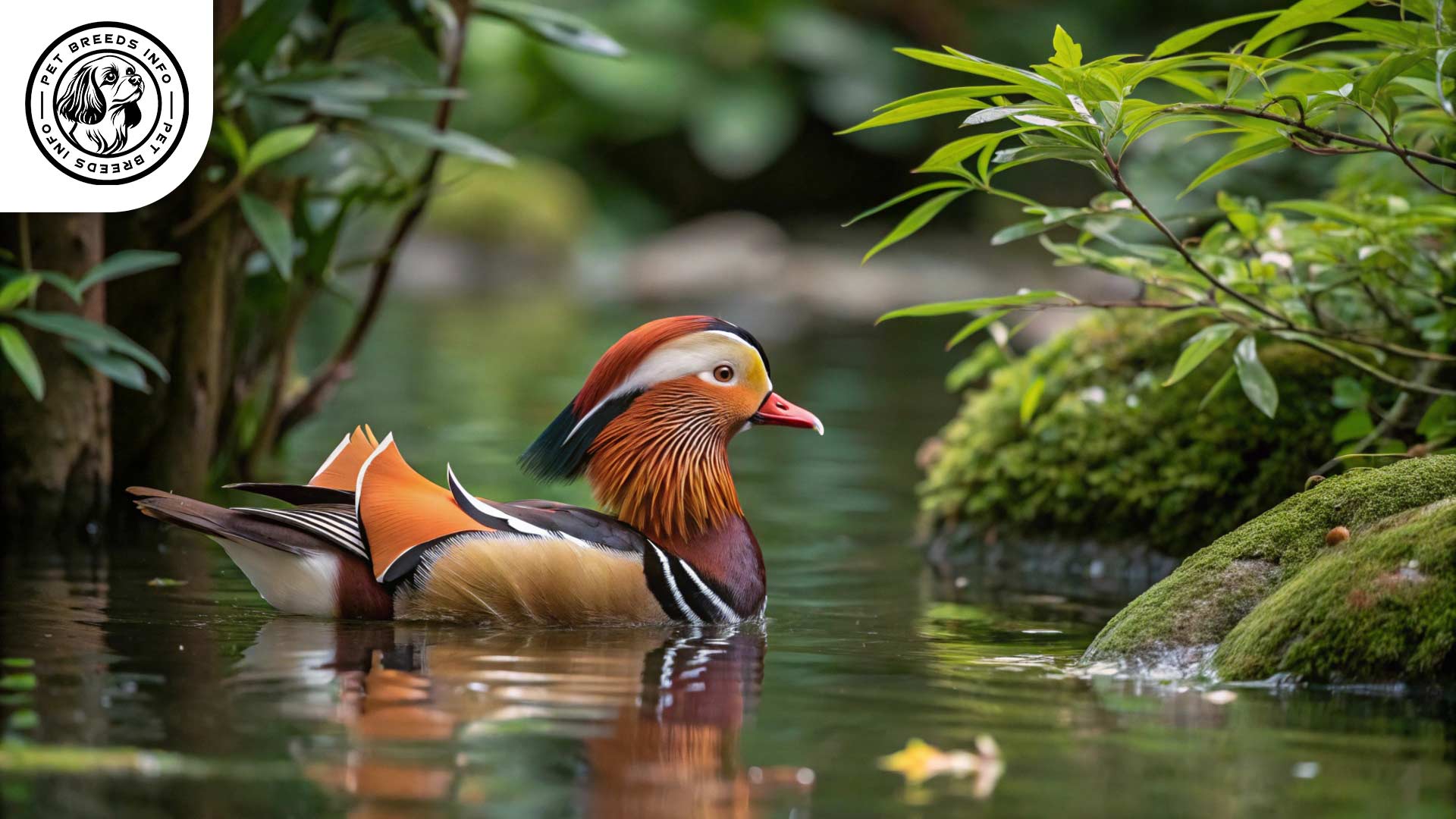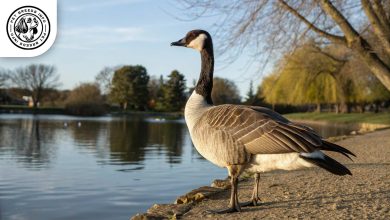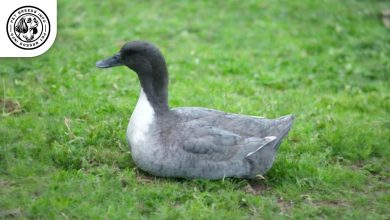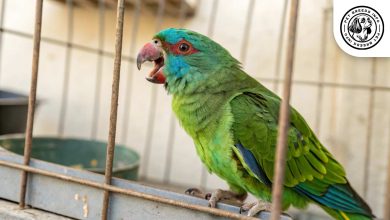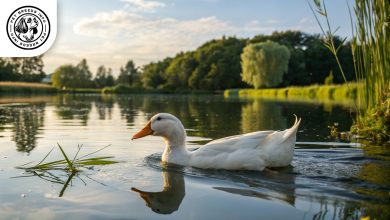Mandarin Duck Breed: Personality, Lifespan, Food & Care
General Introduction of the Breed
The Mandarin Duck (Aix galericulata) is a beautifully ornate waterfowl species known for its striking plumage and exotic appearance. It is also referred to as the “Oriental Duck” in some regions. This species originates from East Asia, particularly China, Japan, and Russia. Mandarin Ducks have historical significance, often symbolizing love and fidelity in Chinese culture. They were introduced to Europe in the 18th century and are now found in various ornamental ponds and aviaries worldwide.
Table of Contents
| Common Name | Mandarin Duck |
| Scientific Name | Aix galericulata |
| Origin | East Asia (China, Japan, Russia) |
| Size | 450–700 g; 40–49 cm in length |
| Lifespan | 10–15 years |
| Colors | Multicolored males; muted brown females |
| Talking Ability | Cannot talk; makes soft whistles and calls |
| Noise Level | Low |
| Social Behavior | Peaceful, monogamous, shy with humans |
Physical Characteristics
Mandarin Ducks are medium-sized ducks, with males being slightly larger than females. Males typically weigh around 630 to 700 grams, while females weigh 450 to 600 grams. They stand about 40 to 49 cm in length with a wingspan of approximately 65 to 75 cm.
The males have vibrant and elaborate plumage, featuring orange, white, blue, and brown feathers with striking patterns. Their most distinctive features include a large, fan-like crest and bright orange “sails” on their wings. Females, in contrast, have more muted brown and gray coloration with white-speckled patterns for camouflage.
Their eyes are dark and round, enhancing their expressive appearance. Both males and females have small, slightly curved beaks that vary from red (in males) to grayish-brown (in females). Their tails are slightly elongated and elegantly pointed.
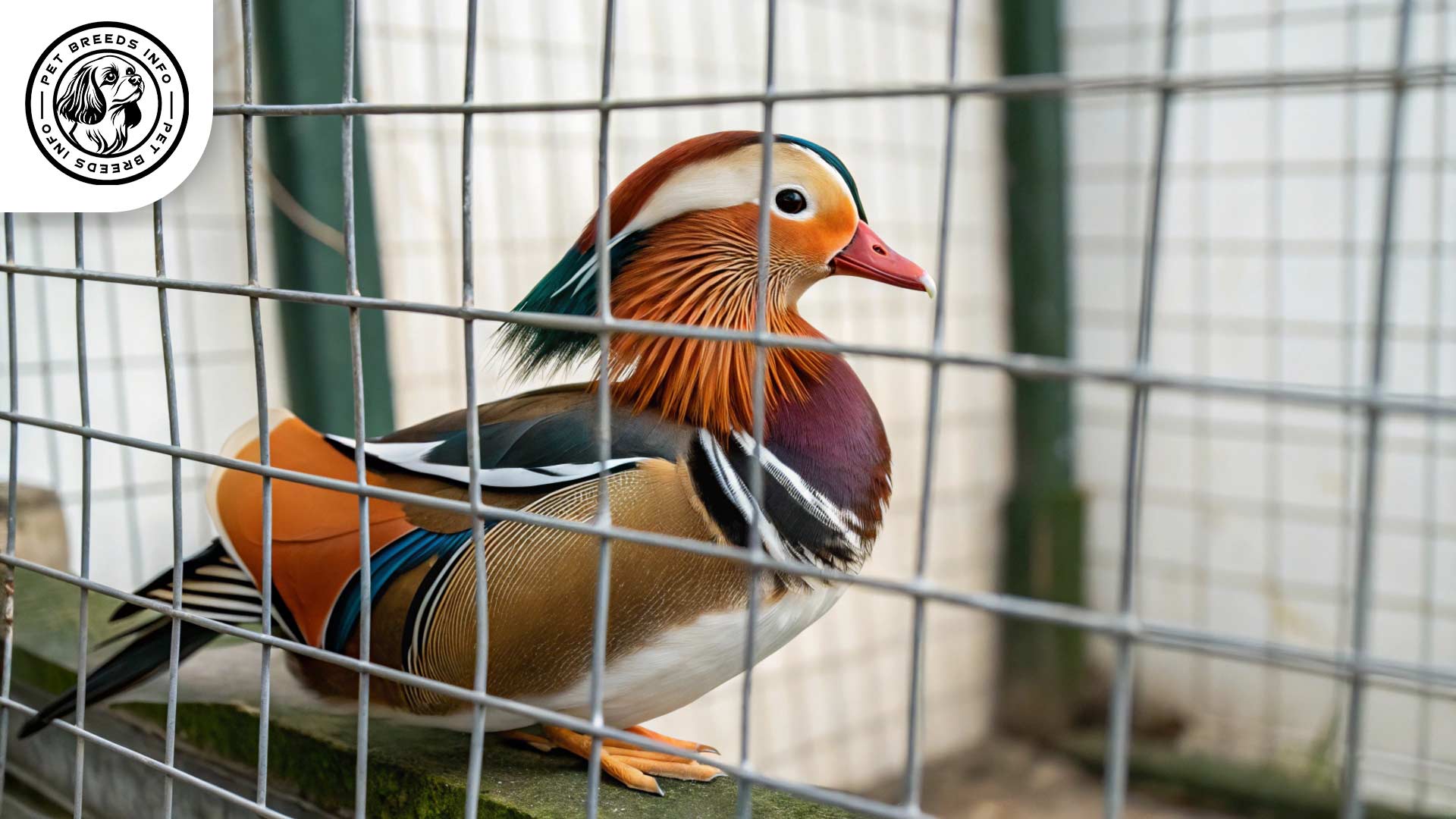
Personality and Temperament
Mandarin Ducks are intelligent and cautious birds. They have a moderate activity level, often preferring to stay close to water sources where they can forage and swim. Although not typically domesticated like other pet birds, they can become accustomed to human presence over time.
They are social within their own species but tend to be reserved or elusive around humans. Mandarin Ducks form strong pair bonds and are known for their monogamous nature. They may exhibit playful behavior, especially during courtship displays. These birds are sensitive to changes in their environment and prefer peaceful, natural settings.
Read More: Campine Chicken
Care and Maintenance Requirements
Mandarin Ducks require a spacious outdoor environment with access to clean water bodies such as ponds or lakes. They are not suited to small indoor aviaries. A natural setting with shelter, trees, and vegetation is ideal for their well-being.
They have low grooming needs, as they naturally maintain their waterproof feathers through regular preening. However, ensuring a hygienic living environment is essential. Providing protection from extreme cold or harsh weather conditions is recommended.
Routine cleaning of water sources, maintaining dry perches, and ensuring a predator-proof enclosure are crucial for their care. Regular health check-ups from an avian vet can help detect any issues early.
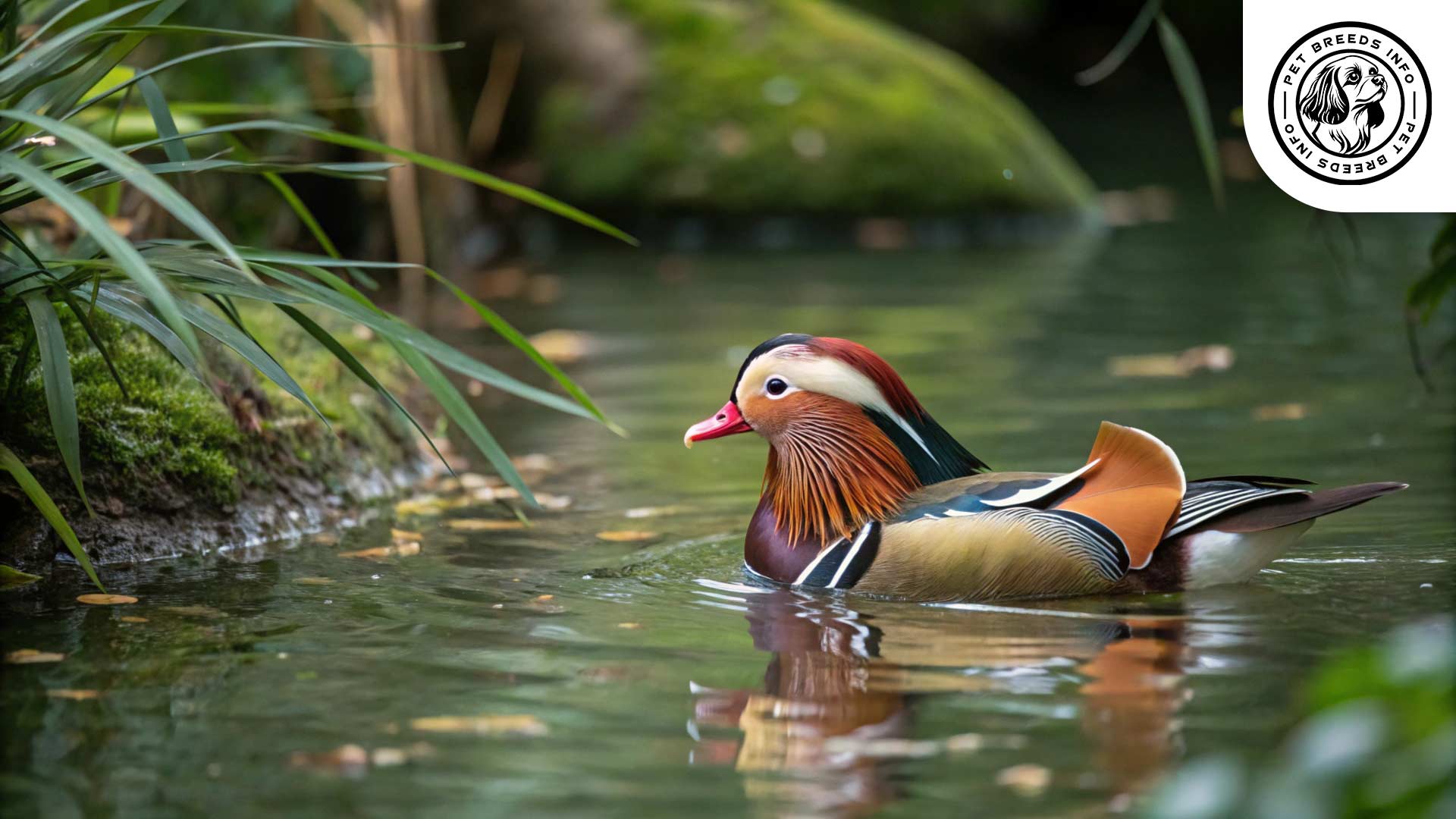
Diet and Nutrition
Mandarin Ducks thrive on a varied diet consisting of grains, seeds, aquatic plants, small invertebrates, and insects. A high-quality waterfowl pellet diet can also provide essential nutrients.
Foods to avoid include processed human food, salty or sugary items, and toxic seeds or plants. Fresh food and access to clean water are vital for maintaining their health. Feeding should be done in moderation to prevent overfeeding and maintain their natural foraging behavior.
Health and Common Medical Issues
Mandarin Ducks are generally hardy birds but can be susceptible to common waterfowl diseases such as avian flu, fungal infections, and parasitic infestations like mites and worms.
They have an average lifespan of 10 to 15 years in captivity with proper care. Regular vaccinations and veterinary check-ups are beneficial for disease prevention. Clean water and a well-balanced diet also play a crucial role in their overall health.
Read More: Hamburg Chicken
Training and Behavior Management
Mandarin Ducks are not typically trained like domesticated birds. However, gradual exposure can help them become more comfortable with human presence.
The best approach to managing their behavior is providing a stress-free environment. They respond well to routine feeding and calm interactions. Early socialization, especially in aviary settings, can help reduce their natural skittishness around people.
Interaction with Other Animals and Humans
Mandarin Ducks are peaceful birds that can coexist with other waterfowl species in a well-maintained aviary or pond. However, they may shy away from overly aggressive birds.
They do not form strong bonds with humans like pet parrots or domesticated ducks but can coexist in garden ponds with minimal interference. They are more suitable for bird enthusiasts and ornamental collections rather than households looking for an interactive pet.
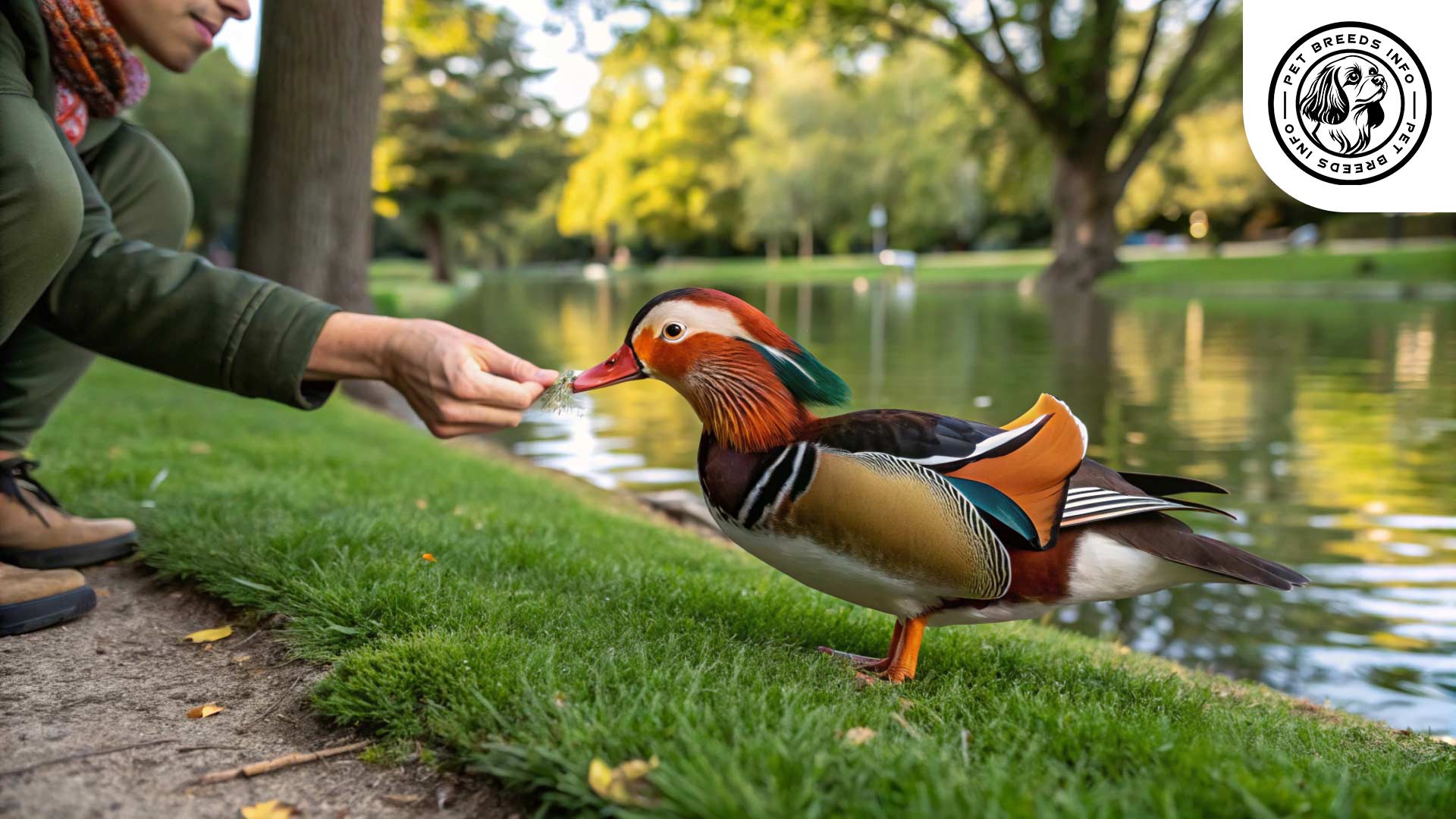
Price and Availability
The cost of Mandarin Ducks varies depending on quality, breeding status, and location. A single duck may cost between $75 to $300, with rare color mutations sometimes priced higher.
When purchasing or adopting, it is important to find reputable breeders or aviary suppliers. Some conservation organizations and avian breeders may offer Mandarin Ducks for sale, while wildlife regulations may apply to keeping them in certain regions.
Read More: Ice Pigeon
Conclusion and Final Thoughts
Mandarin Ducks are stunning ornamental birds best suited for large outdoor settings like ponds and aviaries. They require a natural, peaceful environment and are not ideal for indoor pet companionship.
Potential owners should consider their space, ability to provide clean water habitats, and willingness to observe rather than interact closely with these birds. While not typical pets, Mandarin Ducks offer beauty, serene charm, and a glimpse into nature’s artistic mastery.
FAQ
What is the lifespan of a Mandarin Duck?
Mandarin Ducks can live 10 to 15 years with proper care in a safe and clean environment.
Can Mandarin Ducks be kept as pets?
While not traditionally domesticated, they can be kept in large outdoor aviaries or ponds.
Are Mandarin Ducks noisy?
No, they are relatively quiet and communicate through soft whistles and subtle sounds.
Do Mandarin Ducks need a pond?
Yes, they thrive in environments with natural water sources for swimming and foraging.
How much do Mandarin Ducks cost?
Prices range from $75 to $300, depending on color mutations and breeder reputation.
